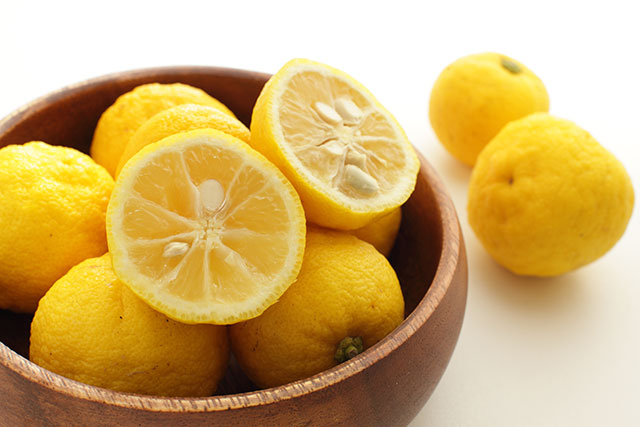A popular citrus fruit in East Asia, the yuzu, helps control your cholesterol levels
10/01/2018 / By Ellaine Castillo

A study, conducted by researchers from the University of Science and Technology in Korea, has revealed that yuzu (Citrus junos Tanaka) prevents fats from accumulating in the liver. This inhibitory effect of yuzu on hepatic lipid accumulation was evaluated using different in vivo and in vitro experiments.
Yuzu is a citrus fruit common in countries like Korea, Japan, and China. Previous studies have shown that this fruit exhibits anti-diabetic, anti-cancer, and anti-inflammatory effects. These properties can be attributed to the presence of bioactive compounds such as rutin, quercetin, tangeretin, naringin and hesperidin. Prior to this study, the inhibitory effect of yuzu on fat buildup in the liver has not been determined.
Hepatic lipid accumulation happens as a result of irregular lifestyle and unhealthy diet. This often goes hand-in-hand with cholesterol and triglyceride buildup, which then lead to atherosclerosis or hepatic steatosis. Aside from these, cholesterol buildup in the blood can also lead to a condition called hypercholesterolemia. Some natural substances are able to prevent these developments by targeting low-density lipoprotein levels and enzymes involved in choleserol synthesis, such as 5′- adenosine monophosphate activated protein kinase (AMPK), and 3-Hydroxy-3-Methylglutaryl-CoA reductase (HMGCR).
In this study, which was published in BMC Complementary and Alternative Medicine, oleic acid was used to stimulate lipid accumulation in HepG2 cells. Ethanol extract of yuzu peels were co-administered with oleic acid to serve as treatment in some setups. It was observed that yuzu enables a dose-dependent inhibition of lipid accumulation of up to 23 percent. Aside from this, it was also determined, based on the results of the MTT cell viability assay, that yuzu extracts are not toxic to the cells.
The power of the elements: Discover Colloidal Silver Mouthwash with quality, natural ingredients like Sangre de Drago sap, black walnut hulls, menthol crystals and more. Zero artificial sweeteners, colors or alcohol. Learn more at the Health Ranger Store and help support this news site.
The in vitro experiments also revealed that yuzu’s mechanism of action targets the AMPK signaling pathway. It is able to inhibit lipid accumulation by stimulating PPAR-alpha, CPT1, and beta-oxidation-related proteins and reducing HMGCR proteins.
In addition to the in vitro studies, in vivo experiments were also conducted, using male C57BL/6 J mice as animal models. These mice were divided into the following: normal diet, high-cholesterol diet without treatment, high-cholesterol diet with one percent yuzu ethanol extract, and high-cholesterol diet with five percent yuzu ethanol extract. A high-cholesterol diet was given to the mice to induce fatty liver.
The researchers were able to observe that changes caused by the high-cholesterol diet were ameliorated by treatment with ethanol extract of yuzu. These changes include increased body and liver weight, increased liver fat content, and altered serum composition, especially total cholesterol and low-density lipoprotein content. Additionally, in vivo experiments also showed the inhibition of HMGCR, FAS and the stimulation of PPAR-alpha, which were initially observed in vitro.
Overall, the results of these experiments show that yuzu is effective in preventing hepatic lipid accumulation, making it a promising candidate for treating hypercholesterolemia. (Related: How to control elevated cholesterol without prescription drugs.)
Home remedies for hypercholesterolemia
Aside from the yuzu, there are other remedies for hypercholesterolemia. These include:
- Exercising – To significantly lower low-density lipoprotein levels, it is recommended that a person should exercise for at least 30 minutes a day, five times a week.
- Following a healthier diet – Maintain proper cholesterol levels by eating more fruits, vegetables, whole grains, and unsaturated fats. These unsaturated fats can be found in foods like fish, nuts, and avocados.
- Maintaining a healthy weight – Obesity or being overweight are associated with high cholesterol levels. For people who are heavier than the ideal weight, losing five to 10 percent of the body weight can be extremely beneficial.
Learn more about potential natural treatments for various diseases by visiting Cures.news today.
Sources include:
Tagged Under: citrus, Citrus junos Tanaka, fats, fatty liver, fruit, hepatic lipid, high cholesterol, hypercholesterolemia, lipids, natural cures, natural remedies, yuja, yuja peels, yuzu, yuzu peels




















